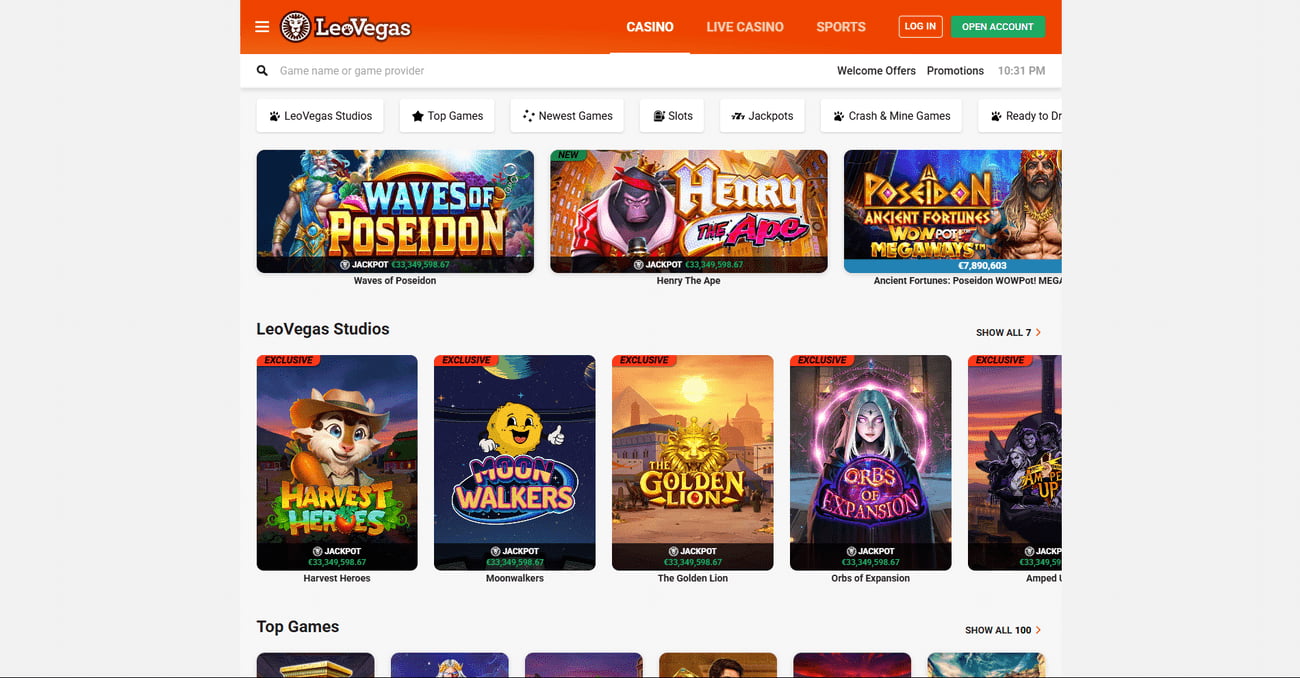For many players, signing up to an online casino begins with excitement and the promise of bonuses, big wins, and smooth gameplay. But behind every reputable operator lies a detailed and often overwhelming set of Terms and Conditions. These are more than just formalities—they directly shape your rights as a player, from how you can use bonuses to when and how you can withdraw your winnings.
LeoVegas Casino, a widely known name in the iGaming industry, operates under multiple licenses and presents itself as a user-friendly, trustworthy platform. However, beneath the surface of this polished experience lies a complex web of clauses that can significantly affect your ability to play, win, and withdraw.
This article dissects the LeoVegas T&Cs, not from a legal perspective, but from a practical, user-first viewpoint. The focus here is on the rules that genuinely impact your player experience, especially those that are less obvious or frequently misunderstood.
Summary: Key Risks to Watch
| Clause or Rule | Why It Matters |
|---|---|
| High wagering requirements | Makes bonus cashouts very difficult without full understanding of terms |
| Vague bonus abuse definitions | Can lead to account penalties or removal of winnings without clear cause |
| Strict one-account-per-IP/device rule | Risks for households with multiple players or shared connections |
| ID verification at any stage | Can delay withdrawals and cancel bonuses if documents are late |
| Payout limits on promos or games | Big wins might be reduced unexpectedly |
| Dormancy fees after 12 months | Your balance may be gradually drained if inactive |
| Cross-border dispute resolution | Harder for international players to pursue complaints |
Bonuses: Appealing Offers With Heavy Conditions
Wagering Requirements
LeoVegas frequently advertises generous welcome offers and free spins. However, the reality of turning bonus funds into withdrawable cash is more complex than it first appears.
Most of LeoVegas’ casino bonuses come with wagering requirements that typically range from 25x to 40x the bonus amount. For example, if you receive a $100 bonus, you may need to wager $4,000 before you’re eligible to withdraw any associated winnings. This is not uncommon in the industry, but the terms at LeoVegas are not always presented with clarity at the point of sign-up, and many players do not read the fine print until it is too late.
Additionally, certain game types may contribute less or not at all toward meeting these requirements. Live casino games, for instance, often contribute only 10% or are outright excluded. This means that players unknowingly using their bonus in low-contribution games could spend hours wagering without making any real progress toward a withdrawal.
Bonus Abuse Clauses
LeoVegas includes several clauses in its T&Cs giving it the right to revoke bonuses or remove winnings if it suspects “abuse.” What constitutes abuse is defined loosely and leaves significant room for interpretation. Examples given include using multiple accounts, exploiting software glitches, or coordinating betting strategies with others. However, the broad language used also allows the operator to act on subjective suspicion.
This can be problematic for honest players who, through no deliberate fault, might trigger internal alerts such as through repeated bonus use, high-value bets, or logging in from shared IP addresses. Once flagged, LeoVegas reserves the right to withhold funds and even suspend accounts pending investigation.
Time Limits and Restrictions
Bonuses at LeoVegas also come with strict expiration periods, often seven days from the moment they’re claimed. If the wagering requirement isn’t met within that time frame, the bonus and any winnings attached to it are automatically forfeited. While this may seem fair on paper, many players accept bonuses without being aware of the short time window, especially when using mobile devices where T&Cs may be less visible.
Account Use: The One-User Rule and Shared Connections
One Account per Household, IP, and Device
LeoVegas enforces a “one account per household” policy. This is not unusual, but the implications for users are significant. According to the T&Cs, only one account is allowed per:
- Household address
- IP address
- Shared computer or mobile device
- Payment method
In practical terms, this means if you and someone else in your home create separate accounts, one or both accounts could be suspended. Similarly, using a public or shared Wi-Fi network, or accessing your account on a friend’s device, could also flag your activity as suspicious.
For users in shared accommodations, co-working spaces, or even families with multiple adult players, this policy poses a genuine risk. Violating it even unintentionally can result in account closure and loss of funds.
Self-Exclusion Enforcement
LeoVegas also participates in responsible gambling programs and allows users to self-exclude. However, players who attempt to circumvent exclusion (even on a different device or payment method) may find their accounts permanently closed. More critically, if a self-excluded user manages to open a second account and loses money, LeoVegas may not be obligated to refund those funds if it can argue that due diligence was followed on its part.
Withdrawals: ID Checks, Delays, and Limits
Identity Verification
Like many regulated operators, LeoVegas adheres to Know Your Customer (KYC) protocols. What is notable, however, is the broad timeframe within which the operator can request documents. While many players expect verification at withdrawal, LeoVegas may demand documentation at any stage—including during active gameplay or after claiming a bonus.
This flexibility means withdrawals can be delayed unexpectedly, and in some cases, if the required documents are not submitted quickly enough, bonus-related winnings may expire or be canceled. The onus is on the player to respond swiftly, even if the timing is inconvenient.
Typical documents requested include:
- A valid government-issued ID
- Proof of address (utility bill or bank statement)
- Proof of ownership of payment methods used
Delays of several days are common during busy periods or if documents are unclear, and users report mixed experiences with customer service response times.
Withdrawal Limits and Caps
One of the less obvious, yet highly impactful clauses in LeoVegas’ T&Cs is the existence of payout limits tied to certain game categories or promotions. While no specific daily or monthly cap applies to regular withdrawals, winnings from some promotional offers, tournaments, or jackpot games may be capped. This means that, even if you see a large win on your screen, what you’re actually eligible to cash out may be far less.
These limits are not always clearly displayed during play. Unless players read the full bonus terms or the specific rules for each game or promo, they may only become aware of the cap when they attempt a withdrawal. This can lead to confusion and disappointment, especially for casual players.
Dormant Accounts and Administrative Fees
LeoVegas outlines that accounts with no activity for 12 consecutive months are considered dormant. Once dormant, the casino may charge a monthly administrative fee, which will be deducted from the player’s real money balance.
If the account remains inactive for an extended period, it may be closed entirely, and any remaining balance forfeited. While this policy is disclosed, it’s not proactively communicated to users as they approach the dormancy threshold.
Players returning to the site after a long break may find their account inaccessible or their funds gone, simply due to a lack of recent logins.
Data Handling and User Privacy
LeoVegas maintains a privacy policy that complies with GDPR and other relevant regulations. However, players should be aware of a few key elements that affect them directly:
- LeoVegas reserves the right to share user data with third parties including regulatory bodies, payment processors, and sports integrity agencies if suspicious activity is detected.
- The operator may also conduct automated profiling to monitor for fraud, problem gambling behavior, or bonus abuse.
While these measures are intended to protect both the operator and the player community, they also involve the processing of significant amounts of personal data. Users concerned about privacy should review the site’s data retention policy and understand their rights regarding access, correction, and deletion of personal information.
Jurisdiction and Dispute Resolution
LeoVegas operates under licenses from several jurisdictions, including Malta, Sweden, and the UK, depending on the user’s location. The applicable law and regulatory authority will vary accordingly.
For players, this has a direct impact on how disputes are handled. For example:
- Users outside the UK are typically governed by Maltese law, which may complicate the process of lodging formal complaints.
- While LeoVegas offers internal complaint handling procedures and links to dispute resolution bodies, these processes can be slow and bureaucratic.
There is no guarantee that disputes will be resolved in the player’s favor, especially in cases involving ambiguous bonus rules or account restrictions.
Final Thoughts
LeoVegas positions itself as a fair, transparent operator, and in many ways, it offers a professional and regulated environment. But that does not mean the experience is always user-friendly or risk-free.
The Terms and Conditions contain several clauses that, while legally standard, can work against the casual or uninformed player. High wagering requirements, strict account rules, delayed verification, and vague bonus policies all contribute to a playing field where users need to be extremely cautious.
Before you claim a bonus, before you share your device, and definitely before you request a withdrawal, take the time to read the fine print. Playing smart at LeoVegas isn’t just about choosing the right game. It’s about understanding the rules that govern everything around it.
If you’re looking for transparency, make sure you’re not just trusting the brand. Trust the words in the terms, because that’s what actually holds up when it matters.



